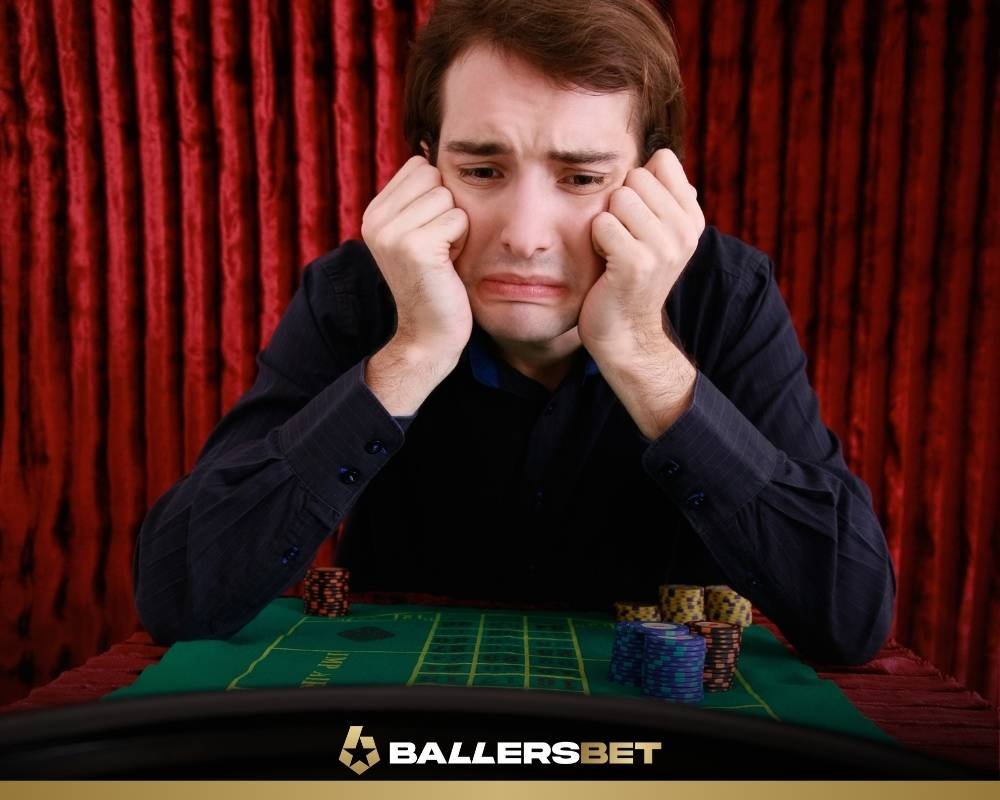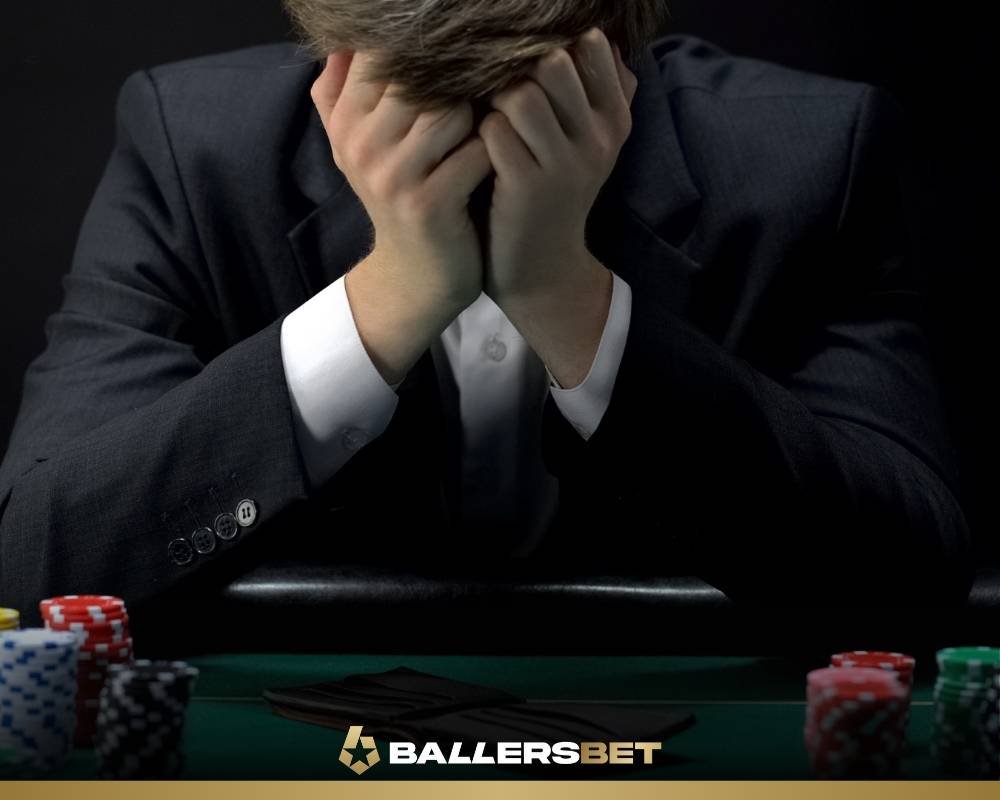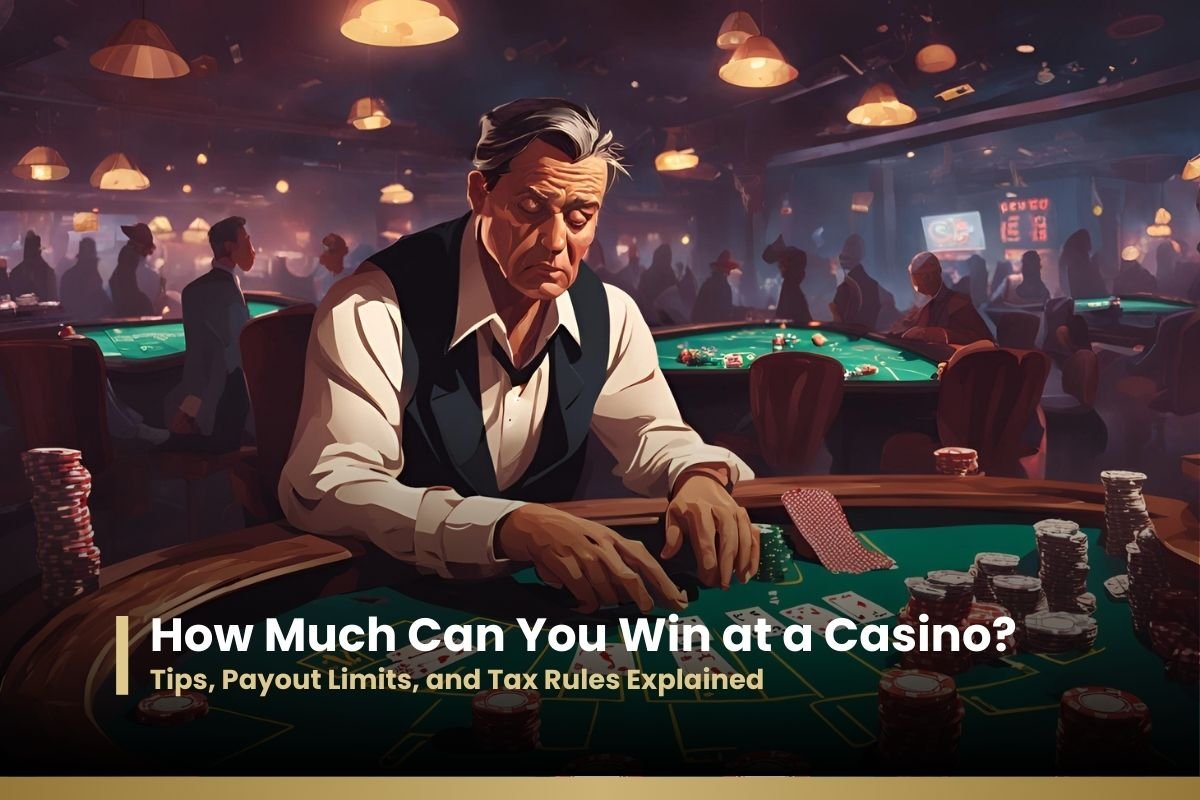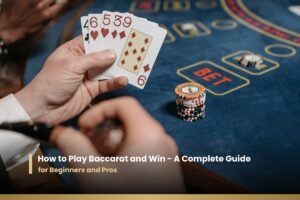Casinos are fun, bright, games and big wins. But losing at the casino is a fact of life for most gamblers. The reality is that casinos are designed to make a profit, which means that most players lose.
Most people lose at the casino because of the house edge, psychological factors, and the addictive nature of gambling. The house edge means the casino always has an advantage, and psychological triggers like bright lights and free drinks keep you playing.
Remember, every game in the casino is designed for you to lose in the long run, and even the best players can lose big. Setting limits and knowing when to stop can prevent big losses.
Would you like more information on coping strategies or the psychology behind gambling losses?
Why You Are Losing at the Casino?

Losing at a casino isn’t just bad luck; it’s a mathematical certainty due to the design of the games and the psychological tricks to keep you playing. Here’s why most people lose:
1. The House Edge
The “house edge” is a built-in statistical advantage that the casino has over you. This varies by game:
- Blackjack: For skilled players the house edge is around 0.5% to 1%, but for beginners it can be much higher.
- Roulette: In American roulette, the house edge is 5.26%, so the casino earns $5.26 for every $100 bet on average.
- Slot Machines: The edge for slot machines is 5% to 15%, making them the most profitable games for the casino.
Casinos are not controlled but designed to make profits. These percentages may seem small, but they add up to the casino making money over millions of bets, and the player loses on average.
2. Psychological Triggers and Casino Design
Casinos are designed to keep you playing longer:
- Bright Lights and Sounds: The constant stimulation from lights and sounds creates excitement and keeps you playing.
- No Clocks or Windows: Without a sense of time, you play for longer, which increases your chances of losing.
- Free Alcohol: Comps like free drinks impair your judgment and make you bet more.
- Rewards Programs: Comps like free meals or hotel stays give you a sense of value and make you want to keep playing.
These are designed to make you lose track of time and keep spending.
3. The Gambler’s Fallacy
The gambler’s fallacy is the false belief that past results affect future outcomes in random games:
- “I’m Due for a Win”: Many believe that after several losses, a win is overdue. However, games like roulette and slot machines are completely random, and past results have no bearing on future outcomes.
- Statistical Reality: Even after a streak of losses, the odds don’t change. This misconception causes many gamblers to bet more and lose more.
Facts and Figures
- Gaming Revenue: In 2022, Las Vegas casinos made over $8 billion in gaming revenue.
- High House Edge: Slot machines with up to 15% house edge are the most profitable for the casino.
- Psychological Impact: A study from the Journal of Gambling Studies found that music, lighting and free drinks increase the time and money spent playing.
Now you know.
Statistics on Casino Losses
Casino losses are rampant, from small amounts for casual visitors to huge hits for high rollers and those with a gambling problem. Here are the numbers:
1. Average Loss per Casino Visit
For most casual gamblers, losses are normal. Studies show that the average casino visitor loses between $50 and $100 per visit. That doesn’t sound like much, but add it up:
- Annual Impact: A weekly visitor losing $100 per visit would lose $5,200 a year.
- Recurring Losses: Casino profits come from these small losses spread across millions of visitors.
2. High Rollers’ Losses
High-stakes gamblers can lose huge amounts in one session:
- Kerry Packer: Lost $20 million in one night at a London casino.
- Terrance Watanabe: Lost over $127 million at Caesars Palace and The Rio in 2007, the largest documented loss.
These are the risks of high-stakes gambling, where even the richest can get hit big.
3. Addiction Stats
Gambling addiction is a big problem:
- Prevalence: 2-3% of gamblers are problem gamblers, 1% are severe problem gamblers.
- Societal Cost: Billions annually in healthcare, lost productivity and criminal justice.
- Emotional and Financial Impact: Problem gamblers often have crushing debt, strained relationships and mental health issues; less than 10% seek help.
These statistics show the risks; we must practice responsibly and be aware of the consequences.
Biggest Gambling Losses on Record

High-stakes gambling can wipe out even the richest of the rich. Here are some of the most notable:
1. Terrance Watanabe: $127 Million
Terrance Watanabe lost $127 million in 2007 at Caesars Palace and The Rio in Las Vegas. His 2 month long gambling binge was 6% of Harrah’s Entertainment’s revenue that year and most of his losses were on baccarat and blackjack.
2. Harry Kakavas: $20 Million
Australian real estate mogul Harry Kakavas lost $20 million in a few hours at Crown Casino in Melbourne. He was betting up to $300,000 a hand on baccarat. He later sued the casino, claiming they took advantage of his addiction, but the court ruled against him.
3. Archie Karas: $40 Million
Archie Karas, who turned $50 into $40 million in a famous winning streak, lost the entire $40 million in a few weeks. His downfall was through poker and dice games in Las Vegas. High-stakes gambling is volatile.
4. Maureen O’Connor: $13 Million
Former San Diego mayor Maureen O’Connor lost $13 million over 10 years playing video poker. Her addiction depleted her late husband’s charitable foundation and got her in legal trouble.
5. Other Losses
- Charles Barkley: Lost $30 million gambling, mostly blackjack and sports betting.
- Michael Jordan: Lost millions betting on golf and in casinos.
- Allen Iverson: Lost millions in casinos and had financial troubles later in life.
These are just a few examples of the risks of high-stakes gambling and how fortunes can be wiped out.
The Emotional Impact of Losing Money at the Casino
Losing money while gambling can have serious emotional and psychological effects, impacting a person’s mental health, financial stability, and relationships. Here’s a concise breakdown of the key impacts of real & online casinos:
1. Loss Chasing
Loss chasing is a dangerous cycle where players bet more to recover their losses. This behaviour can lead to mounting debts and worsened financial outcomes.
- Psychological Trap: Driven by anxiety and desperation, gamblers believe they can win back losses, but the odds remain against them.
- Prevalence: According to the National Council on Problem Gambling, over 75% of problem gamblers report chasing losses, exacerbating their financial struggles.
2. Financial Stress
Consistent losses can create overwhelming financial pressure, leading to severe consequences:
- Debt Crisis: The average problem gambler in the U.S. has around $55,000 in debt, with some cases much higher.
- Family Strain: Financial stress often causes relationship conflicts, and research from the University of Buffalo shows families of problem gamblers are at a higher risk of domestic violence and instability.
- Mental Health: The financial burden can trigger anxiety and depression, with 20% of pathological gamblers having attempted suicide, according to the National Council on Problem Gambling.
3. Self-Esteem and Identity
Gambling losses can damage a person’s self-worth and identity:
- Shame and Guilt: The emotional aftermath of losing large sums often includes intense guilt, damaging self-esteem and making it difficult to seek help.
- Identity Crisis: Significant financial losses may lead to an identity crisis, especially for those who pride themselves on financial stability. The stigma around gambling addiction often leads to social isolation.
Supporting Statistics
- Mental Health: About 60% of problem gamblers suffer from anxiety and 50% experience depression.
- Suicide Risk: Problem gamblers have one of the highest suicide rates, with 1 in 5 attempting suicide.
- Family Impact: Children of problem gamblers often experience emotional and behavioural challenges due to a lack of stability at home.
These impacts highlight the severe consequences of gambling losses and the importance of awareness and support for those affected.
How to Prevent or Minimise Losses
Gaming responsibly can help reduce financial losses and the emotional impact of gambling. Here’s how:
1. Set a Budget
- Limit Your Spend: Before you start, decide how much you’re willing to lose and treat it as an entertainment expense. Stick to this limit, and don’t bring extra cash or credit cards.
- Cash Only: Bringing cash stops overspending. Research shows over 80% of problem gamblers exceed their initial budget and end up in financial stress.
2. Limit Time
- Plan Your Visit: Set a strict time limit and use alarms to keep track. Casinos are designed to make you lose track of time, and longer gambling sessions (over 3 hours) increase your risk of big losses.
- Stay Fresh: Don’t do marathon sessions, which can lead to fatigue and poor decision-making.
3. Avoid Emotional Gambling
- Stay Calm: Don’t gamble when you’re stressed or emotional, as this can lead to silly bets. Emotional gamblers are 40% more likely to chase losses than those who gamble cool.
4. Get Help
- Support Groups: Organizations like Gamblers Anonymous offer peer support. Only 10% of problem gamblers seek help, but support helps them recover.
- Professional Help: Therapy can address underlying issues, and self-exclusion programs can block access to gambling environments.
Use these to game responsibly and be in control of your money and life.
Seeking Help for Gambling Losses
Knowing when gambling has become a problem is key to your financial and emotional health. Here’s how to spot the signs and get help:
1. Spotting a Problem
- Warning Signs: If you’re gambling to “win back” losses or it’s affecting your finances and relationships, it’s time to get help. Over 80% of problem gamblers hide their gambling or lie about losses.
- Financial Impact: The average debt for problem gamblers in the US is $55,000, and financial struggles lead to a lot of stress and conflict.
2. Recovery Resources
Here are a few organizations that can help right away:
- Gamblers Anonymous: 12-step program and support groups. 1 in 3 members report a significant reduction in gambling.
- Kindbridge and Algamus: Specialized therapy for gambling addiction, virtual counselling and residential treatment.
These offer community support and structured programs that work.
3. Therapy and Counseling
- Cognitive-Behavioral Therapy (CBT): Works for harmful gambling behaviors, 60% success rate in reducing addiction.
- Triggers: Therapists help identify emotional triggers and develop healthier coping mechanisms.
- Family Involvement: Counseling often includes family members to repair trust and relationships.
Facts
- High Relapse Rate: Without treatment, 70% of problem gamblers relapse, so ongoing support is key.
- Support Group Success: Attending meetings regularly makes recovery 50% more likely than quitting alone.
- Economic Impact: Gambling addiction costs the US $6.7 billion a year in lost productivity, healthcare and legal issues.
Getting help early makes a big difference in recovery, so get help and support.
Important Facts to Remember About Gambling Addiction
It’s Designed for You to Lose
Casinos are designed to win; the games are always in the house’s favour. For example, American roulette has a 5.26% house edge, so that you will lose in the long run. Knowing this will help with expectations.
Know When to Stop
Set your limits on money and time before you gamble. Research shows those who set limits are twice as likely to avoid big losses. Walk away when you hit your limit to keep gambling under control.
Lost Money is Hard to Get Back
It’s statistically impossible to win back lost money by gambling more. 75% of problem gamblers fall into loss chasing, worsening their situation. Accept the loss, and don’t chase the gamble.
Remember these and gamble safely and responsibly.
FAQs
Q. Can I beat the casino and make a profit?
While you can have short-term wins, the odds are stacked against the casino in the long term. Skilled players in games like real or online poker, or online blackjack may have a better chance, but even they have a house edge and can’t guarantee profits. Never gamble to make money.
Q. How can I not lose too much at the casino?
Before gambling, set a budget and time limit and stick to it. Use cash only, no credit cards. Take regular breaks, and don’t gamble when emotional or stressed. Once your budget is gone, it’s time to walk away.
Q. Is chasing losses a bad idea?
Yes, chasing losses—betting more to try to win back money—almost always leads to even more losses. 75% of problem gamblers chase losses which can lead to financial disaster. Accept losses and don’t try to win back.
Q. How do I know I have a gambling problem?
Signs include hiding your gambling, lying about losses, using money you can’t afford to lose or feeling stressed about your finances. If gambling is affecting your relationships or causing financial strain you may need help. Seek professional help if these behaviors are present.
Q. Where can I get help for gambling addiction?
Organizations like Gamblers Anonymous, Kindbridge and Algamus offer support for those with gambling addiction. You can also see a therapist or counselor, which has been proven to help. Remember, seeking help is a sign of strength, not weakness.
Q. Can I gamble safely?
Yes, gambling can be safe if you treat it as entertainment. Set limits on how much time and money you spend, gamble with money you can afford to lose and don’t chase losses. Always keep it fun, not profit.
Conclusion
Gambling can be fun if done responsibly, but you must understand the risks. Remember, casinos are designed for you to lose; chasing losses will only get you into deeper financial trouble. Setting limits, knowing the house edge and knowing when to stop are key to keeping your gambling safe.
If gambling is affecting your finances or relationships, don’t hesitate to reach out to organizations like Gamblers Anonymous. Responsible gambling is all about having fun without risking your well-being.
Note: Ballersbet is a betting platform for users 18+. Betting carries financial risk, so please gamble responsibly and make informed choices.

I’m a Michele, Casino Analyst and Reviewer at Ballersbet.com, where I specialize in providing honest insights and expert reviews of the latest casino games and platforms. With a passion for online gaming and a commitment to transparency, I strive to help players make informed decisions in the ever-evolving world of online casinos.






